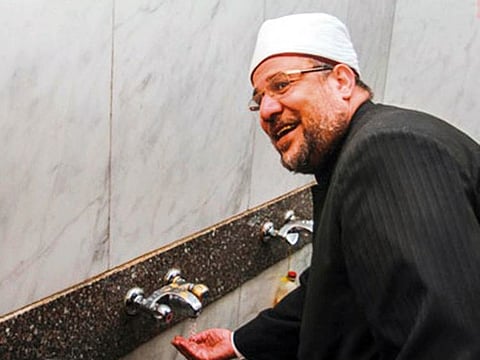Frugal Egypt turns on water-saving taps
Measures taken to conserve more water as a row over Nile resources intensifies

Cairo: Locked in a row with Ethiopia over a dam construction, Egypt is seriously working to conserve water as the country is struggling to cope with needs of a mushrooming population. One step is the introduction of water-saving taps. Mosques in mostly Muslim Egypt mark a milestone in a massive water conservation campaign in this country of nearly 100 million people.
Last week, ministers of Waqfs (religious affairs), irrigation and military production launched an ambitious project to instal water-saving taps into thousands of mosques across the nation.
“Ratilonalising water is an Islamic, national and economic issue in order to preserve the gift of water,” Waqfs Minister Mohammad Jumaa said at the launch ceremony in Cairo.
“Working committees comprising scholars from the Waqfs and irrigation engineers have been formed to oversee the implementation of the project.”
Jumaa, whose ministry is in charge of mosques, added that courses are planned for a large number of clerics with the aim of promoting the “culture of conservation” in sermons.
Muslims pray five times a day and are enjoined to perform them at mosques where washing places are usually an essential part of the sites. Ablution is required before prayers.
The locally manufactured water-saving devices have already been installed in ablution places of three major mosques in Cairo, including the famed Hussein Mosque named after the grandson of the Prophet Mohammad (peace be upon him).
The taps have been found to cut water use by up to 75 per cent, according to officials.
“This is a unique experiment that started more than two months ago in the three mosques and showed promising results,” spokesman for the Waqfs Ministry Jaber Tayae said.
“The ministry is keen to generalise this idea in cooperation with state institutions. It will be expanded to cover 120,000 mosques across the country,” he told Gulf News. “The experiment comes as part of strenuous state efforts to rationalise water consumption,” he added.
“All people should cooperate in achieving this. Islam prohibits all aspects of extravagance,” Tayaee said. “We should remember that the Prophet Mohammad peace be upon him forbade overuse of water in ablution even from a flowing river,”he added.
“Egypt’s population has increased by 25 million in the past 10 years,” said Irrigation Minister Mohammad Abdul Atti. “Had it not been for the measures taken recently, the current quota [of the Nile waters] would not have been adequate,”he added.
Last year, the Egyptian parliament passed legislation authorising the irrigation minister to ban or restrict the cultivation of water-intense crops. Violators face up to six months in jail and a hefty fine.
“Installing water-saving devices in mosques is very important within the framework of rationalisation efforts,” the irrigation minister said last week.
Muslim worshippers have reacted differently to the move.
“Water is an issue of life and death. So, this is a great idea, which will, God willing, save large quantities of water in view of the big numbers of mosques spread across the country,” Hamed Abdul Ghafur, a resident in the north Cairo quarter of Shubra, said. “Some people consume too much water while they do ablution although this behaviour is un-Islamic. I hope these taps will be available at the market for reasonable prices so that people will also use them in their houses,” he added.
While hailing the idea of fitting mosques with water-saving taps, Fawzy Mahmoud, a pensioner, sees the situation differently. “I think before this, the Waqfs Ministry should have first trained mosque preachers in addressing issues of direct relevance to people’s life such as the importance of preserving water and making this a lifestyle,” said the 65-year-old man, who also lives in Shubra. “Of course, it is good to cut water consumption in mosques. But what about the huge amounts of water wasted due to faulty taps in houses and government buildings?”
Competition over Nile waters
Egypt fears that Ethiopia’s construction of the massive Renaissance Dam will negatively affect its share of the River Nile--, its main source of water. Ethiopia has denied that the hydroelectric dam will harm Egypt’s interests. Egypt, Ethiopia and Sudan -- three Nile countries—have been trying to resolve the row at a series of negotiating rounds.
Egypt’s annual quota of the Nile waters is estimated at 55.5 billion cubic metres. Water sharing among the 10 Nile Basin countries is regulated under a colonial-era treaty. Some riparian countries have deemed the treaty unfair and sought to change it amid Egyptian protests.
But even with its share of the Nile waters intact, Egypt’s fast-growing population of around 2.5 million annually makes it hard to the country to cover their needs. Egyptian officials have recently warned against what they called “water poverty” and pushed for an all-out conservation.



